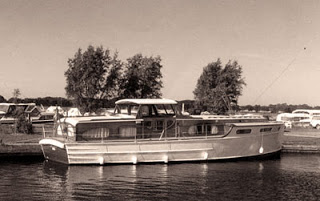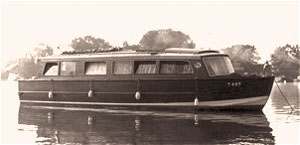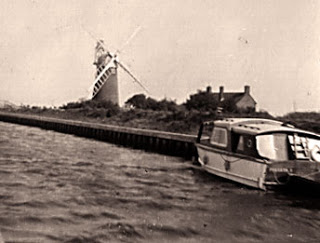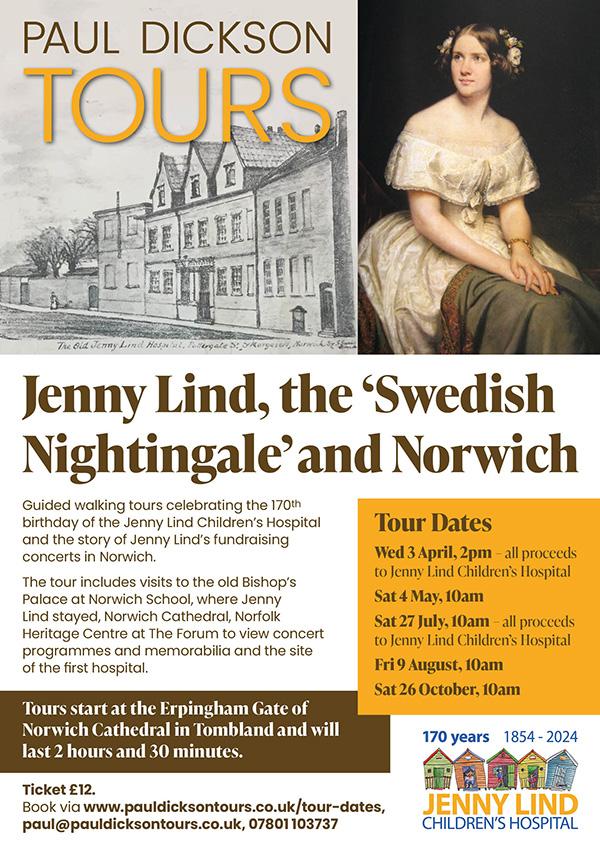Holidays Afloat,
The Misery Guts On Holiday
We’ve dismissed the cruise as an idea, but Ma’am will inevitably still have it lodged at the back of her mind, and she will twig that you don’t need to go on liners the size of a small town. You can have your own boat and cruise the waterways of Great Britain for a week.
If it sounds attractive, it’s because you are letting your heart rule your brain. The last boating holiday I took was on a four-berth cabin cruiser on the Norfolk Broads in 1969. The only thing I can properly recall about it was receiving an official reprimand from the river police for doing 7mph in a 5mph zone. I was speeding. Speeding! At 7mph! One in the eye for Lewis Hamilton, huh?
 You must do some soul-searching here. Have you ever driven a boat? Have you ever been on a sailing yacht? If the answer to both questions is no, then use the brochures as novelty toilet paper.
You must do some soul-searching here. Have you ever driven a boat? Have you ever been on a sailing yacht? If the answer to both questions is no, then use the brochures as novelty toilet paper.
Boats come in three distinct types: sailing boats, cabin cruisers, narrow boats. (I know there are other types, but you’re not likely to borrow a trawler or an oil tanker for a week, are you?)
A sailing boat needs wind to drive and if there is no wind, you’re up sh*t creek … or whatever creek the map tells you it is. That’s when you dig out the paddles and drum and drive Ma’am to exhaustion as she rows you back to Oulton Broad.
On the other hand, don’t rely on the weather forecast. If Michael Fish’s non-event, 1987 hurricane decides to pay us a second visit, you’ll whistle along the rivers like you’re determined to break the world water speed record. You’ll shoot through the port of Lowestoft so fast that you’ll be half way to Rotterdam before Air Sea Rescue can catch you.
As with driving on the roads, there are rules to sailing the rivers, but they’re not always reliable. That 30000 ton coaster coming straight for you needs room and time to make a turn, and before you can say, “it’s all right, luv, sail has right of way over power,” he’ll slice you in two.
Do you know a spinnaker from a spanker, a mains’l from a Genoa? I thought not. They’re sails. They drive the boat, but here’s the rub, they only drive it in the same direction as the wind blows. And it’s no use telling Ma’am that you can’t go to Norwich because the wind is blowing you towards the open sea. There is a specialised technique for sailing against the wind (I should know, I’ve been doing it since the day I got married) called tacking, and if you don’t know how to tack, book your boat one way only and get used to the attractions of Great Yarmouth which is as far as you can go in a south-westerly wind.
Enough of sail, what about cabin cruisers? Remember what was said about caravans? Well a cabin cruiser is nothing more than a caravan with a keel added and the wheels removed. You’d think that because the wheels have been nicked, someone must have left it parked in Liverpool overnight, but no, this time it’s deliberate.
Someone has also fitted an engine to this caravan, so you don’t need to worry about hoisting the mains’l. Trouble is, while they may have installed an engine, there are no brakes.
This is often used by Physics tutors as a demonstration of the law of conservation of angular momentum.
It works like this: the Empress stands on the front of the boat, ready to jump off and moor. You drive towards the quayside frantically looking for the handbrake. You can’t find it, boat hits dock, Ma’am is thrown off by the force of the impact and gets a dunking in the Yare.
It is also used by English language tutors as a demonstration of Anglo-Saxon. You may not have heard some of the names she will call you when she gets out of the water.
Another difference between the boat and caravan or car is that it will not stay put. Left to its own devices it has a tendency to float off down the river. You get back from the pub, p****d out of your brains on rough cider and wander the pathways, swearing blind that you parked the boat right here, where the big gap is. It is the last you will ever see of your luggage. The boat will be found three days later near Potter Heigham Bridge, with your pork pies in the fridge and leaving the local constabulary trying to work out what happened to the crew of this latter-day Mary Celeste.
What did you do wrong? You forgot to anchor the boat to the bank, didn’t you? You should have tied the painter to the dockside. (If you’re looking for any gags such as the painter’s only crime was only putting a coat of cheap creosote on next door’s fence, forget it. I’m way better than that.)
 The difficulties associated with a cabin cruiser apply to a narrow boat too, but when you get on one of these things, you’ll learn why they’re called narrow. There’s so little space in them that if She Who Must Be Obeyed turns round too quickly, you’ll have to duck before her bubs knock you flat.
The difficulties associated with a cabin cruiser apply to a narrow boat too, but when you get on one of these things, you’ll learn why they’re called narrow. There’s so little space in them that if She Who Must Be Obeyed turns round too quickly, you’ll have to duck before her bubs knock you flat.
Narrow boats traditionally tour the canals, not rivers. Imagine that; a peaceful holiday calling at such exotic locations as London, Northampton, Leicester. Does life get any better than this? The Grand Union canal even has spurs that go to Slough and Bishops Stortford. Wow. If you’re really daring, you could try the Leeds-Liverpool canal, passing Bradford, Keighley, Burnley, Blackburn, Preston and Wigan. I don’t know how I hold myself back.
If you were to buy one of these tubs, it would set you back something like 40 grand, second hand. That’s getting on for £1000 per foot of the boat’s length. Now that you know this, you can understand why the owners rent them out at anything up to £1200 per week. They’re determined to recoup their investment as quickly as possible, and from your wallet, so put a stop on it immediately.
If talking about the cost doesn’t work, let Her Indoors know about the problems of a canal boat holiday. The boats travel slower than your average road roller and they don’t have a steering wheel. Instead they have a tiller. This is a long handle. You push it one way to turn left, the other to turn right, but the real skill is holding it dead centre to keep the boat moving in a straight line. Why is it a skill? Because traditionally, British canals are full of old prams, dustbins, iron bedrails and abandoned cars, all of which tend to knock the rudder to one side or other as you tootle along at three miles an hour.
Then there are hills to consider. Chugging away in a 44 tonne, 1972 ERF, when you come to a hill, you just drop a gear and hit the accelerator. Water doesn’t work like that. It’s gravitationally operated, which means it travels downhill and try as you might, you won’t make it over the Pennines in a souped-up barge. So there are locks to negotiate. When you enter a lock, someone has to get off the boat to operate it. Since Ma’am can’t drive the thing, she will have to do all that work, winding handles, pushing gates open and shut again. By the time she’s done a week of that, she’ll have lost three stones and be fitter than an Olympic sprinter. She’ll also have biceps like an Olympic weightlifter, so you’d better watch your tongue.
There are certain areas that are common to all boating holidays.
Sex on board is no different to sex anywhere else . . . to you and your erstwhile. But it is different for everyone else. You tend to rock the boat, which causes a slight swell on the river, and rocks everybody else’s boat too. Before you get to “GERONIMO!” half the riverbank is demanding that you either pack it in or invite them in. If you’re really on form, you could give rise to a tsunami the likes of which Reedham and Acle have not seen since the Luftwaffe bombed the sugar beet factory at Cantley in the mistaken belief that the silos were gasometers.
 Like a real cruise on a real ship, a boating holiday will mean a different village and different pub every night. But don’t imagine you can tie up for free. The landlords of all these riverside joints, not content with charging outrageous prices for a pint of mild and a scotch egg, soon latched onto the possibility of charging despicable mooring fees and what do you get for your money? The chance to tie your boat to a bit of tatty riverbank so that when you come back, blathered out of your brains, you can slip on the mud and take an earlier bath than you’d planned.
Like a real cruise on a real ship, a boating holiday will mean a different village and different pub every night. But don’t imagine you can tie up for free. The landlords of all these riverside joints, not content with charging outrageous prices for a pint of mild and a scotch egg, soon latched onto the possibility of charging despicable mooring fees and what do you get for your money? The chance to tie your boat to a bit of tatty riverbank so that when you come back, blathered out of your brains, you can slip on the mud and take an earlier bath than you’d planned.
In conclusion, then, boating may be an experience, but like extracting your own teeth, it’s one you should try to avoid.








